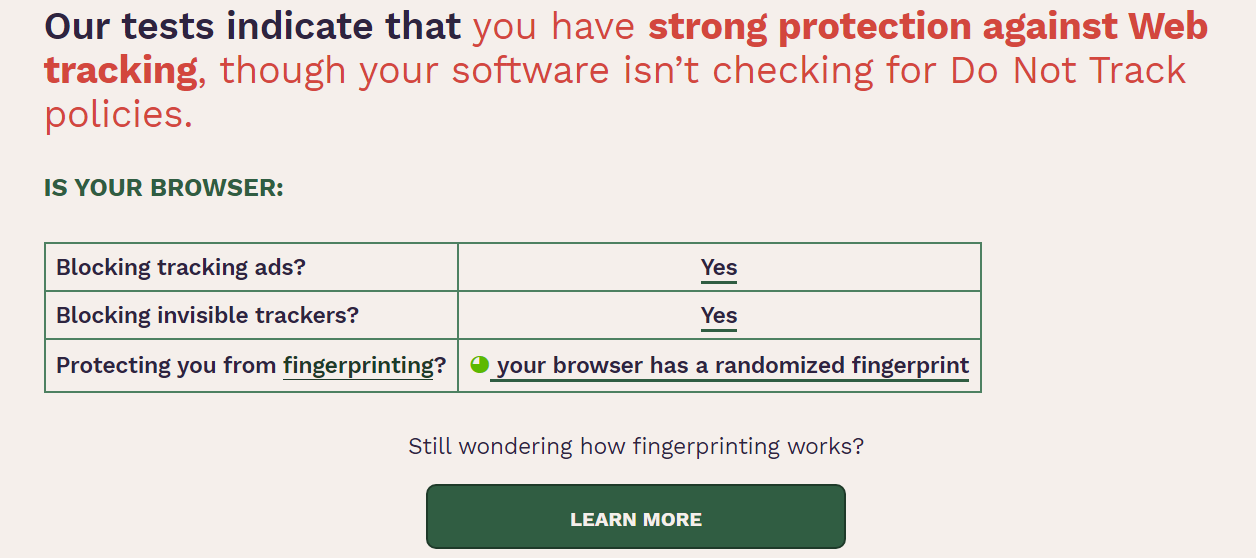Fingerprinting protection
-
This would be a great feature -- along with something like Container Tabs (à la Firefox) this would make Vivaldi reign supreme in all areas, not just customizability.
Firefox claims to have fingerprint protection (not enabled by default) but a Panopticlick test right now indicates that a fresh install with no add-ons and fingerprint protection enabled still results in a unique browser fingerprint among 285,000 tested in the last 45 days.
The Brave browser comes with fingerprinting protection enabled by default, and a similar Panopticlick test returned that the fingerprint was randomized and not unique.
Below: Brave browser's fingerprint protection. Can Vivaldi implement something similar so we can have top notch privacy and top not customization?

-
I don't understand why the browser is not private for such a long period of time?
it seems to me that some developers receive salaries from large corporations and they do not implement surveillance to display ads.
-
@tverye I second the request
-
Are you really ignoring user's privacy?
Why don't you implement anti fingerprinting for the mobile version of Vivaldi? If it's for technical reasons please explain it. It may help to understand the development decision. -
@AnastasiaVi said in Fingerprinting protection:
it seems to me that some developers receive salaries from large corporations and they do not implement surveillance to display ads.
The way Vivaldi gets money is cleared stated: search engine promotion, browser in cars and predefined bookmarks. It is very sustainable non privacy invasive way for financing a browser. You claim seems to have no basis whatsoever, so I immediately reject your supposition and may ask for evidence of what you said, in other way, it can only be called a conspiracy theory.
-
@jochen01 said in Fingerprinting protection:
Are you really ignoring user's privacy?
Why don't you implement anti fingerprinting for the mobile version of Vivaldi? If it's for technical reasons please explain it. It may help to understand the development decision.Achieving a good fingerprint protection scheme isn't so easy. If you want to avoid fingerprinting all together use Tor. At what cost?: no extensions, slow navigation, no tools, no interface personalization. So yes: fingerprint protection can not be so easy to implement in such a feature rich browser. It doesn't mean is impossible, it means that the focus is in other more requested things. It doesn't mean that Vivaldi is ignoring user privacy, but focusing on other aspects of it.
-
@uyx said in Fingerprinting protection:
If you want to avoid fingerprinting all together use Tor.
I assume that you know how wrong you are.
 TOR is MUCH MORE than just avoiding fingerprinting.
TOR is MUCH MORE than just avoiding fingerprinting.
I understand that it's your decision not to fix fingerprint protection. Thank you for clarification. And yes, I am using TOR as an alternative browser if privacy is essential. -
@jochen01 said in Fingerprinting protection:
@uyx said in Fingerprinting protection:
If you want to avoid fingerprinting all together use Tor.
I assume that you know how wrong you are.
 TOR is MUCH MORE than just avoiding fingerprinting.
TOR is MUCH MORE than just avoiding fingerprinting.
I understand that it's your decision not to fix fingerprint protection. Thank you for clarification. And yes, I am using TOR as an alternative browser if privacy is essential.Sorry, I never said the only thing Tor can do is avoid fingerprinting, so I don't know to what claim you said I was wrong (????) Btw you can also use it as your default browser if you want to.
-
@uyx Seems to be a misunderstanding.
You: If you want to avoid fingerprinting all together use Tor.
Me: TOR does much more than avoiding fingerprinting. Your answer reads as: "if you want to avoid fingerprinting, you have to live with slow network performance."But I have understood: You don't want to avoid fingerprinting vivaldi instances. It took a while until you made a clear statement. BTW: You are member of the development team? That's a statement of the development team? I would just like this to be made clear
-
Hi,
IDK how good is this, but maybe does somethingchrome://flags/#enable-fingerprinting-protection-blocklist
